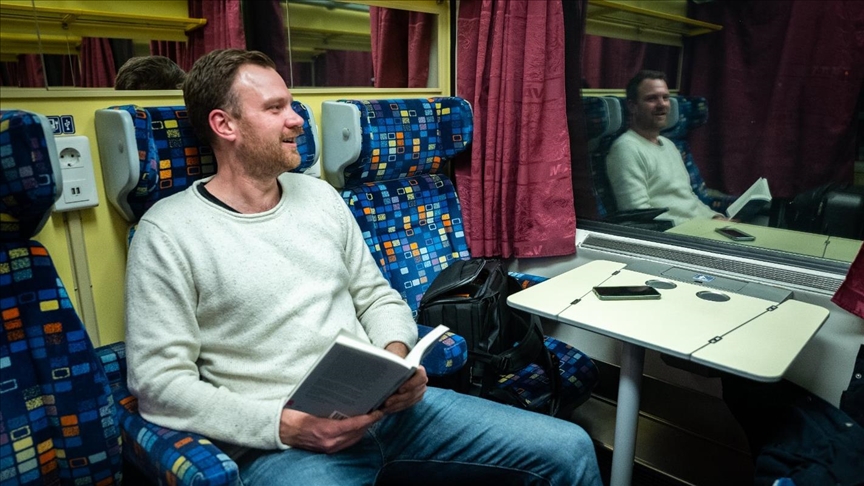Dutch adventurer on 10-day trip to Dubai Expo to leave lower carbon imprint
Wiebe Wakker says traveling to UAE by land will result in 450 kg of carbon emissions, whereas flying will result in 1,100 kg
 Credit: Plug Me In project
Credit: Plug Me In project
ANKARA
A Dutch adventurer who holds the current world record for longest electric car drive has set off on a 10-day journey to Dubai, where he is scheduled to speak at the ongoing Expo 2020.
Wiebe Wakker has racked up 95,000 kilometers (59,000 miles) of mileage in an electric vehicle (EV) -- the longest in the world -- having crossed through 33 countries from the Netherlands to Australia in just over three years.
Speaking to Anadolu Agency on the road to Dubai, one of the seven Sheikhdoms of the United Arab Emirates (UAE), Wakker said he was careful to leave a low carbon footprint during the trip.
"When I was invited to speak at the expo, I also wanted to do this without flying to reduce my emissions. Also, to me, it doesn’t make sense to fly somewhere to talk about a trip I (took to) promote sustainable mobility," he noted.
Noting that he was trying to reduce his carbon footprint in his daily life as well as his overseas travels, Wakker noted that he toured Europe without flying last year, taking the train from Amsterdam to London and driving an EV to Oslo.
"This worked really well. No problems at all," he said of his travels to many European countries last year.
Having calculated his potential carbon footprint on the route to the UAE, he said he discovered that traveling by land would result in 450 kg of emissions while flying would result in 1,100 kg.
"Of course, I understand that traveling for 10 days to give one speech is for most people not time efficient. (But) traveling by land, I want to make people aware of the impact they have on the climate," he said, urging people to make more conscientious travel decisions.
Wakker, who is also the founder of the Plug Me In project, aiming to gather people in support of sustainable mobility, began his adventure on Monday from Amsterdam and has traveled by train and bus through Europe and Turkiye before settling on the route to Iran. After a 10-day journey through nine countries, he will arrive in the UAE aboard a ferry across the Persian Gulf on Jan. 12.

Next project
Speaking more about his current trip, Wakker said it was not just about promoting sustainable innovations or EVs, but also about "global collaboration and perseverance."
"Above all, it's a message that if we work together, we can achieve a lot."
In response to a question on the latest developments in renewable energy, particularly in electric vehicles, he confirmed that there has been rapid progress, such as expanding charging infrastructure in Western European countries, prompting an increase in demand for EVs.
"Right now it's very easy to do a cross-continental European road trip. Also charging (vehicles) in cities has become more convenient," he added. Also, with the introduction of new fully electric models, customers have more options, he added.
Despite these encouraging advances, he lamented that the greatest obstacle for EVs was their high price.
"When the price drops to below the price of traditional cars, sales will really take off."
Apart from that, he said there are still some key things that need to be done to achieve a greater shift toward renewables, such as ending fossil fuel subsidies and putting a price on carbon, phasing out coal, investing more in wind and solar energy, and providing government incentives for installing solar at home.
"My next project is to write a book about my electric road trip, and I have plans to create a new platform to promote sustainable initiatives and innovations," Wakker vowed.
On Wednesday, he announced on Twitter that he would enter Iran on Jan. 9 instead of the planned date of Jan. 7 due to a border closure amid spiking in COVID-19 cases.




